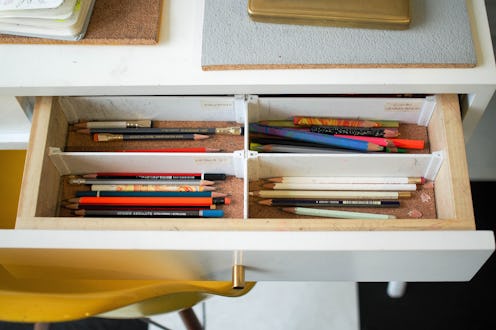Life
Unexpected Ways To Keep Yourself Organized

Organization can be the eternal battle in our day-to-day lives. It often seems like just as soon as we've cleaned our rooms and immaculately rearranged our shelves, we're right back to where we started within a few short days, and finding creative ways to stay organized seems suddenly impossible.
And a lack of organization doesn't just cost us valuable time in the long run, but according to a study published in the Personality and Social Psychology Bulletin, it can actually have negative effects on our mental health, with women who describe their homes as "cluttered," or "unfinished," generally having higher rates of stress and depression than women who described their living spaces as "restful," and "restorative." Additionally, in an article for Psychology Today, Psychologist Dana Gionta, Ph.D., says that the more control we perceive we have over our lives, the less stress we will feel.
Since we know there are concrete benefits to staying organized, the question really is how do we actually do it? Some people seem born with a natural ability to stay unbelievably organized, leaving the rest of us to wonder where to even begin. But the good news is there are plenty of tips and strategies out there that can help organize even the messiest among us. Here's a compilation of the best tips below.
1. Make Your Bed
In a list for staying organized on Apartment Therapy, professional organizer Jeni Aron recommends simply making your bed each day. She says it only takes two or three minutes tops, and that, "A made bed encourages me to hang up clothes and return magazines and books to shelves instead of piling them up on gathered sheets and tilted pillows." Not to mention, it's that much better to come home to.
2. Create Email Folders
Sometimes emails and keeping up with contact information can be a huge source of our organizational anxiety, so Aron recommends creating email folders. You can keep emails separated by personal, work, medical, school, etc., and be able to more quickly find the information you need. "When the project or year is over, go nuts with deleting," Aron says.
3. Invest In A File Cabinet
Blogger and Slow Your Home podcaster Brooke McAlary recommends investing in a filing cabinet for all of the various papers in your home. For those new to an organizational system, she says to go through your space and grab every single item of paper clutter, and then spend time putting it in the appropriate file category. McAlary also recommends creating a "to do" pile and keeping it in plain sight, such as keeping bills you need to pay right by your computer.
4. Utilize Storage Organizers
Author of The Organized Life and professional organizer Stephanie Denton recommends using storage tools, especially for places like your closet and bedroom that can potentially accumulate a lot of clutter. She lists handy items such as shoe cubbies, hanging multi-pocket organizers, and rolling under-bed organizers as great ways to keep things like shoes in their place and also easily findable. She also recommends hooks for jewelry and accessories so that you can actually see what you have.
5. Schedule Weekly Declutter Sessions
In an article for Oprah, professional organizer Julie Morganstern recommends scheduling weekly declutter sessions into your weekly routine, as opposed to just waiting for a moment of organizing inspiration to strike.
Aron also recommends taking 15 minutes every day for general organization upkeep. "I sort the mail right away, as soon as I retrieve it from the mailbox. I put things back in their 'homes' once I'm done with them. This way, I don't have junk piles all over my apartment that I have to spend hours on a Sunday wrangling and cursing," she says.
6. Never Label Anything "Miscellaneous"
Morganstern also recommends never labeling anything as "miscellaneous," saying that "within a week you've forgotten what's in there." Instead she says to keep labeling specific, whether it's instruction manuals, cleaning supplies, or electric bills. It will save you way more time in the long run.
7. Throw Stuff Out!
Aron says that a huge key to organization is letting go of what you don't need to minimize clutter. "When you're not using something, but you're just holding onto it to 'have it,' that's the beginning seeds of clutter," she says. She also recommends keeping your routines simple and just sticking to them. "I know I only like Aveda shampoo and Kiehl's face wash," she says. "This seemingly shallow information actually creates less confusion and clutter in my shower. In the mornings I'm not wrestling with a test laboratory of 18 different bottles of lotions and potions."
Organization and decluttering doesn't have to be a mammoth-sized job, and instead can often just entail a little time each day on daily maintenance. And don't worry if you don't change your entire life over night — adopting any or all of the above tips is a great start to feeling more in control and reducing organization-related anxiety.
Images: Pexals